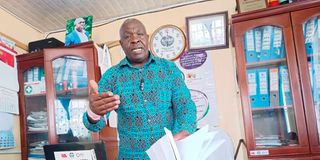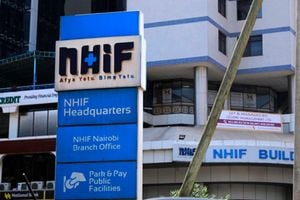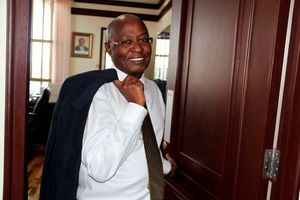Elijah Mwega, the man empowering elderly women in Kenya

Elijah Mwega, the founder of Kenyan Aged people Require Information, Knowledge & Advancement, during the interview at his office in Dagoretti South, Nairobi, June 13, 2024.
What you need to know:
- Elijah Mwega founded Kenyan Aged People Require Information, Knowledge & Advancement 20 years ago to give the older women and men a voice to be heard and respected, and lobby for laws protecting their rights.
- Besides educating them about their rights, they also equip them with knowledge about group dynamics, leadership and coming up with income-generating projects to sustain themselves.
In 2018, Monica Kamau, a resident of Dagoretti South in Nairobi City County, turned 71.
At this age, Monica was a year past the eligible age for receiving the state-funded cash transfer for older persons in Kenya, popularly known as Inua Jamii (Swahili for uplift a community or family).
But she had never heard about this scheme, until a fellow older woman invited her to one of their group meetings at an organisation based in their area that empowers older persons with relevant information and life skills.
Read: The elderly deserve care
“I was amazed at how they were so informed about what the Constitution says about the rights of the older persons, and that there was money called Inua Jamii for the older persons,” Monica recollects.
“Mwega told me where to register for the cash transfer and how to do it. I went to the social development officer’s office, registered and months later, I visited the office and I was told my money had come. I was very happy,” Monica shares excitedly.
My interview with Monica was grounded in the adequacy and effectiveness of Inua Jamii. In the process, she said older women and men are unaware of the availability of the state-funded pension for the older poor persons.
Grateful
And so she was grateful to Mwega for helping her access the funds. The person she is referring to is Elijah Mwega, who founded Kenyan Aged People Require Information, Knowledge & Advancement (Karika) 20 years ago to give the older women and men a voice to be heard and respected, and lobby for laws protecting their rights.
“Our mission is to inform, educate and promote policies and practices that improve the quality of life for our older people in society,” Elijah says.
Monica is a testament of his impressive work. For the past two decades, he has touched more than 600,000 older women and men in 21 counties where Karika partners with local older persons’ organisations.
Besides educating them about their rights, they also equip them with knowledge about group dynamics, leadership and coming up with income-generating projects to sustain themselves.
Additionally, they encourage them to form groups through which they offer each other psychosocial support and maintain good health through sharing their struggles and ideas for living a better life, singing and dancing, as well as cooking together.
“We give them room to beat isolation,” he asserts.
Often, older persons isolate themselves to avoid the torture of disgraceful treatment from the community, he says.
But when they come to Karika, they become alive because they gain the power to resist oppression and abuse.
“People call older persons shosh and guks, names that have no meaning. They are legally allowed to have official names. No one has a right to nickname them,” he states.
Discrimination
Rosemary Wanja, 72, has also been empowered by Elijah that she outright resists any discriminatory treatment.
“If someone tells me ‘you, old woman, get out of the way.’ I turn around, and tell them ‘someday you’ll be old like me,’” she says.
Elijah, however, says the government has failed the older persons in many ways. “The government says it’s implementing Vision 2030 whose clarion call is to not leave anyone behind, but many old people are left behind with the cash transfer,” he notes.
Similarly, the Sh2,000 monthly cash transfer is too little for the older persons, especially women who are caregivers of three to four grandchildren, he decries.
He adds: “The government wants Kenyans to access public services through e-Citizen, but are the older women and men tech-savvy? We have adult education, but where are the teachers to offer age-friendly technology training?”
On health, he observes that the government has failed to create ward units designated for the older persons.
“They are put in general wards where they are not given geriatric services,” he says.
To promote their wellbeing, he recommends creation of social or daycare centres where they can access necessary information as well as socialise to eliminate old-age loneliness and isolation.
“Parliament needs to urgently create a law protecting the rights of older persons. We don’t have any at the moment,” he pleads with legislators.





